| Southport : Original Sources in Exploration | | |
Travels in Tartary, Thibet, and China
During the years 1844-5-6. Volume 1Evariste Regis Huc
| | | | |
|
Chapter 1 (part 2)
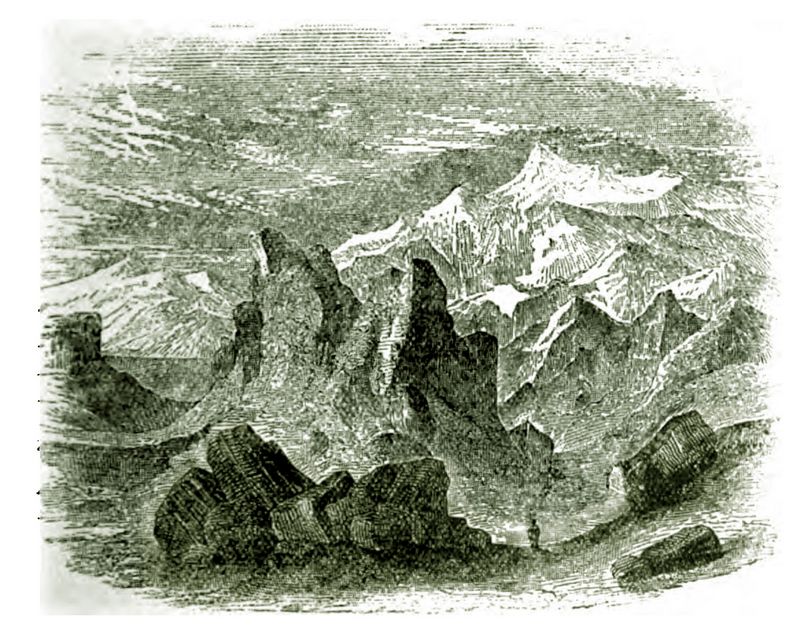
Fig.7: Mountain of Sain-Oula
The
mountain in question is called Sain-Oula (Good Mountain), doubtless ut
lucus a non lucendo, since it is notorious for the dismal accidents and
tragical adventures of which it is the theatre. The ascent is by
a rough, steep path, half-choked up with fallen rocks. (p.22)
Mid-way up is a small temple, dedicated to the divinity of the
mountain, Sain-Nai, (the good old Woman;) the occupant is a priest,
whose business it is, from time to time, to fill up the cavities in the
road, occasioned by the previous rains, in consideration of which
service he receives from each passenger a small gratuity, constituting
his revenue. After a toilsome journey of nearly three hours we
found ourselves at the summit of the mountain, upon an immense plateau,
extending from east to west a long day’s journey, and from north to
south still more widely. From this summit you discern, afar off
in the plains of Tartary, the tents of the Mongols, ranged
semi-circularly on the slopes of the hills, and looking in the distance
like so many bee-hives. Several rivers derive their source from
the sides of this mountain. Chief among these is the Chara-Mouren
(Yellow River—distinct, of course, from the great Yellow River of
China, the Hoang-Ho)—the capricious, course of which the eye can follow
on through the kingdom of Gechekten, after traversing which, and then
the district of Naiman, it passes the stake-boundary into Mantchouria,
and flowing from north to south, falls into the sea, approaching which
it assumes the name Léao-Ho.
The Good Mountain is noted for its
intense frosts. There is not a winter passes in which the cold
there does not kill many travellers. Frequently whole caravans,
not arriving at their destination on the other side of the mountain,
are sought and found on its bleak road, man and beast frozen to
death. Nor is the danger less from the robbers and the wild
beasts with whom the mountain is a favourite haunt, or rather a
permanent station. Assailed by the brigands, the unlucky
traveller is stripped, not merely of horse and money, and baggage, but
absolutely of the clothes he wears, and then left to perish from cold
and hunger.
Not but that the brigands of these parts are
extremely polite all the while; they do not rudely clap a pistol to
your ear, and bawl at you: “Your money or your life!” No; they
mildly advance with a courteous salutation: “Venerable elder brother, I
am on foot; pray lend me your horse—I’ve got no money, be good enough
to lend me your purse—It’s quite cold to-day, oblige me with the loan
of your coat.” If the venerable elder brother charitably
complies, the matter ends with, “Thanks, brother;” but otherwise, the
request is forthwith emphasized with the arguments of a cudgel; and if
these do not convince, recourse is had to the sabre.
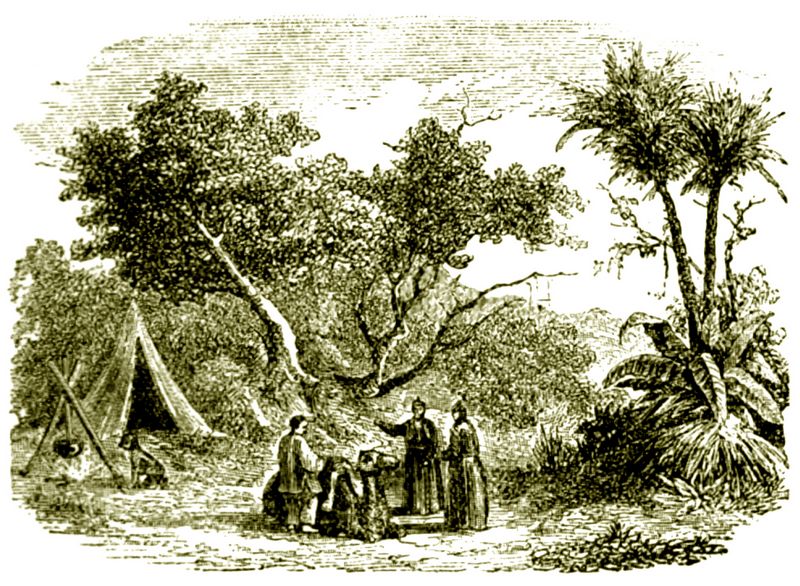
Fig.8: First Encampment
Being novices
in travelling, the idea of robbers haunted us incessantly, and we took
everybody we saw to be a suspicious character, against whom we must be
on our guard. A grassy nook, surrounded by tall trees,
appertaining to the Imperial Forest, fulfilled our requisites.
Unlading our dromedaries, we raised, with no slight labour, our tent
beneath the foliage, and at its entrance installed our faithful porter,
Arsalan, a dog whose size, strength, and courage well entitled him to
his appellation, which, in the Tartar-Mongol dialect, means
“Lion.” Collecting some argols (p.23) and dry branches of trees,
our kettle was soon in agitation, and we threw into the boiling water
some Kouamien, prepared paste, something like Vermicelli, which,
seasoned with some parings of bacon, given us by our friends at
Yan-Pa-Eul, we hoped would furnish satisfaction for the hunger that
began to gnaw us. No sooner was the repast ready, than each of
us, drawing forth from his girdle his wooden cup, filled it with
Kouamien, and raised it to his lips. The preparation was
detestable—uneatable. The manufacturers of Kouamien always salt
it for its longer preservation; but this paste of ours had been salted
beyond all endurance. Even Arsalan would not eat the
composition. Soaking it p. 24for a while in cold water, we once
more boiled it up, but in vain; the dish remained nearly as salt as
ever: so, abandoning it to Arsalan and to Samdadchiemba, whose stomach
by long use was capable of anything, we were fain to content ourselves
with the dry-cold, as the Chinese say; and, taking with us a couple of
small loaves, walked into the Imperial Forest, in order at least to
season our repast with an agreeable walk. Our first nomade
supper, however, turned out better than we had expected, Providence
placing in our path numerous Ngao-la-Eul and Chan-ly-Houng trees, the
former, a shrub about five inches high, which bears a pleasant wild
cherry; the other, also a low but very bushy shrub, producing a small
scarlet apple, of a sharp agreeable flavour, of which a very succulent
jelly is made.
The Imperial Forest extends more than a hundred
leagues from north to south, and nearly eighty from east to west.
The Emperor Khang-Hi, in one of his expeditions into Mongolia, adopted
it as a hunting ground. He repaired thither every year, and his
successors regularly followed his example, down to Kia-King, who, upon
a hunting excursion, was killed by lightning at Ge-ho-Eul. There
has been no imperial hunting there since that time—now twenty-seven
years ago. Tao-Kouang, son and successor of Kia-King, being
persuaded that a fatality impends over the exercise of the chase, since
his accession to the throne has never set foot in Ge-ho-Eul, which may
be regarded as the Versailles of the Chinese potentates. The
forest, however, and the animals which inhabit it, have been no gainers
by the circumstance. Despite the penalty of perpetual exile
decreed against all who shall be found, with arms in their hands, in
the forest, it is always half full of poachers and woodcutters.
Gamekeepers, indeed, are stationed at intervals throughout the forest;
but they seem there merely for the purpose of enjoying a monopoly of
the sale of game and wood. They let any one steal either,
provided they themselves get the larger share of the booty. The
poachers are in especial force from the fourth to the seventh
moon. At this period, the antlers of the stags send forth new
shoots, which contain a sort of half-coagulated blood, called
Lou-joung, which plays a distinguished part in the Chinese Materia
Medica, for its supposed chemical qualities, and fetches accordingly an
exorbitant price. A Lou-joung sometimes sells for as much as a
hundred and fifty ounces of silver.
Deer of all kinds abound in
the forest; and tigers, bears, wild boars, panthers, and wolves are
scarcely less numerous. Woe to the hunters and wood-cutters who
venture otherwise than in large parties into the recesses of the
forest; they disappear, leaving no vestige behind.
p. 25The fear
of encountering one of these wild beasts kept us from prolonging our
walk. Besides, night was setting in, and we hastened back to our
tent. Our first slumber in the desert was peaceful, and next
morning early, after a breakfast of oatmeal steeped in tea, we resumed
our march along the great Plateau. We soon reached the great Obo,
whither the Tartars resort to worship the Spirit of the Mountain.
The monument is simply an enormous pile of stones, heaped up without
any order, and surmounted with dried branches of trees, from which hang
bones and strips of cloth, on which are inscribed verses in the Thibet
and Mongol languages.
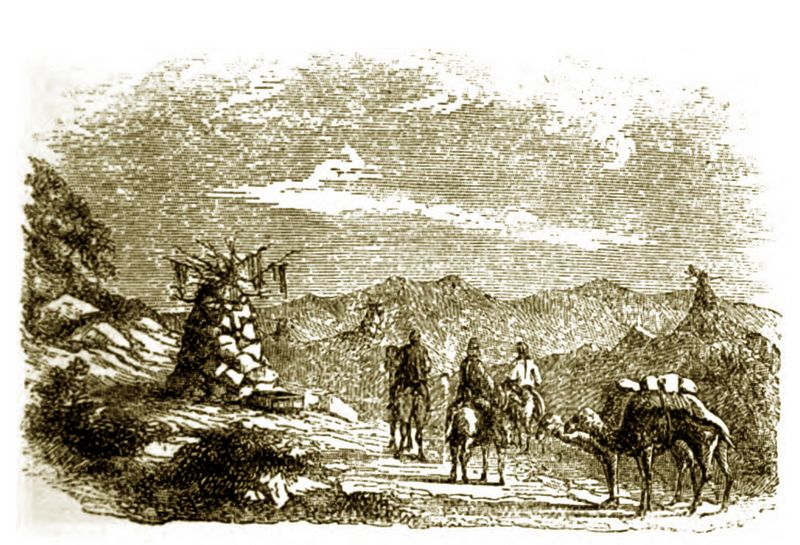
At its base is a
large granite urn in which the devotees burn incense. They offer,
besides, pieces of money, which the next Chinese passenger, after
sundry ceremonious genuflexions before the Obo, carefully collects and
pockets for his own particular benefit.
These Obos, which occur
so frequently throughout Tartary, and which are the objects of constant
pilgrimages on the part of the Mongols, remind one of the loca excelsa
denounced by the Jewish prophets.
It was near noon before the
ground, beginning to slope, intimated that we approached the
termination of the plateau. We then descended rapidly into a deep
valley, where we found a small Mongolian encampment, which we passed
without pausing, and set up our tent for the night on the margin of a
pool further on. We p. 26were now in the kingdom of Gechekten, an
undulating country, well watered, with abundance of fuel and pasturage,
but desolated by bands of robbers. The Chinese, who have long
since taken possession of it, have rendered it a sort of general refuge
for malefactors; so that “man of Gechekten” has become a synonyme for a
person without fear of God or man, who will commit any murder, and
shrink from no crime. It would seem as though, in this country,
nature resented the encroachments of man upon her rights.
Wherever the plough has passed, the soil has become poor, arid, and
sandy, producing nothing but oats, which constitute the food of the
people. In the whole district there is but one trading town,
which the Mongols call Altan-Somé, (Temple of Gold). This was at
first a great Lamasery, containing nearly 2000 Lamas. By degrees
Chinese have settled there, in order to traffic with the Tartars.
In 1843, when we had occasion to visit this place, it had already
acquired the importance of a town. A highway, commencing at
Altan-Somé, proceeds towards the north, and after traversing the
country of the Khalkhas, the river Keroulan, and the Khinggan
mountains, reaches Nertechink, a town of Siberia.
The sun had
just set, and we were occupied inside the tent boiling our tea, when
Arsalan warned us, by his barking, of the approach of some
stranger. We soon heard the trot of a horse, and presently a
mounted Tartar appeared at the door. “Mendou,” he exclaimed, by
way of respectful salutation to the supposed Lamas, raising his joined
hands at the same time to his forehead. When we invited him to
drink a cup of tea with us, he fastened his horse to one of the
tent-pegs, and seated himself by the hearth. “Sirs Lamas,” said
he, “under what quarter of the heavens were you born?” “We are
from the western heaven; and you, whence come you?” “My poor
abode is towards the north, at the end of the valley you see there on
our right.” “Your country is a fine country.” The Mongol
shook his head sadly, and made no reply. “Brother,” we proceeded,
after a moment’s silence, “the Land of Grass is still very extensive in
the kingdom of Gechekten. Would it not be better to cultivate
your plains? What good are these bare lands to you? Would
not fine crops of corn be preferable to mere grass?” He replied,
with a tone of deep and settled conviction, “We Mongols are formed for
living in tents, and pasturing cattle. So long as we kept to that
in the kingdom of Gechekten, we were rich and happy. Now, ever
since the Mongols have set themselves to cultivating the land, and
building houses, they have become poor. The Kitats (Chinese) have
taken possession of the country; flocks, herds, lands, houses, all have
passed into their hands. There remain to us only a few prairies,
on which still live, under their tents, such of the (p.27) Mongols as
have not been forced by utter destitution to emigrate to other
lands.” “But if the Chinese are so baneful to you, why did you
let them penetrate into your country?” “Your words are the words
of truth, Sirs Lamas; but you are aware that the Mongols are men of
simple hearts. We took pity on these wicked Kitats, who came to
us weeping, to solicit our charity. We allowed them, through pure
compassion, to cultivate a few patches of land. The Mongols
insensibly followed their example, and abandoned the nomadic
life. They drank the wine of the Kitats, and smoked their
tobacco, on credit; they bought their manufactures on credit at double
the real value. When the day of payment came there was no money
ready, and the Mongols had to yield, to the violence of their
creditors, houses, lands, flocks, everything.” “But could you not
seek justice from the tribunals?” “Justice from the
tribunals! Oh, that is out of the question. The Kitats are
skilful to talk and to lie. It is impossible for a Mongol to gain
a suit against a Kitat. Sirs Lamas, the kingdom of Gechekten is
undone!” So saying, the poor Mongol rose, bowed, mounted his
horse, and rapidly disappeared in the desert.
We travelled two
more days through this kingdom, and everywhere witnessed the poverty
and wretchedness of its scattered inhabitants. Yet the country is
naturally endowed with astonishing wealth, especially in gold and
silver mines, which of themselves have occasioned many of its worst
calamities. Notwithstanding the rigorous prohibition to work
these mines, it sometimes happens that large bands of Chinese outlaws
assemble together, and march, sword in hand, to dig into them.
These are men professing to be endowed with a peculiar capacity for
discovering the precious metals, guided, according to their own
account, by the conformation of mountains, and the sorts of plants they
produce. One single man, possessed of this fatal gift, will
suffice to spread desolation over a whole district. He speedily
finds himself at the head of thousands and thousands of outcasts, who
overspread the country, and render it the theatre of every crime.
While some are occupied in working the mines others pillage the
surrounding districts, sparing neither persons nor property, and
committing excesses which the imagination could not conceive, and which
continue until some mandarin, powerful and courageous enough to
suppress them, is brought within their operation, and takes measures
against them accordingly.
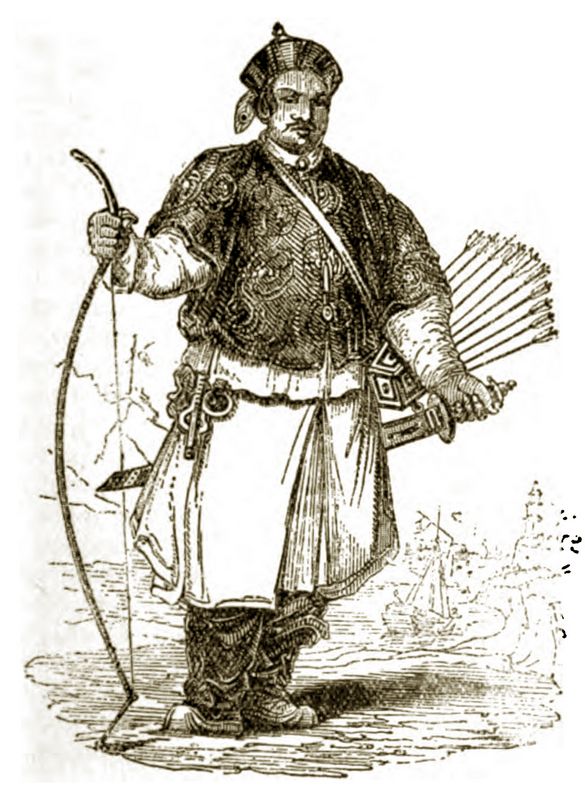
Fig.10: Military Mandarin
One day, however, the
Queen of Ouniot, repairing on a pilgrimage to the tomb of her
ancestors, had to pass the valley in which the army of miners was
assembled. Her car was surrounded; she was rudely compelled to
alight, and it was only upon the sacrifice p. 29of her jewels that she
was permitted to proceed. Upon her return home, she reproached
the King bitterly for his cowardice. At length, stung by her
words, he assembled the troops of his two banners, and marched against
the miners. The engagement which ensued was for a while doubtful;
but at length the miners were driven in by the Tartar cavalry, who
massacred them without mercy. The bulk of the survivors took
refuge in the mine. The Mongols blocked up the apertures with
huge stones. The cries of the despairing wretches within were
heard for a few days, and then ceased for ever. Those of the
miners who were taken alive had their eyes put out, and were then
dismissed.
We had just quitted the kingdom of Gechekten, and
entered that of Thakar, when we came to a military encampment, where
were stationed a party of Chinese soldiers charged with the
preservation of the public safety. The hour of repose had
arrived; but these soldiers, instead of giving us confidence by their
presence, increased, on the contrary, our fears; for we knew that they
were themselves the most daring robbers in the whole district. We
turned aside, therefore, and ensconced ourselves between two rocks,
where we found just space enough for our tent. We had scarcely
set up our temporary abode, when we observed, in the distance, on the
slope of the mountains, a numerous body of horsemen at full
gallop. Their rapid but irregular evolutions seemed to indicate
that they were pursuing something which constantly evaded them.
By-and-by, two of the horsemen, perceiving us, dashed up to our tent,
dismounted, and threw themselves on the ground at the door. They
were Tartar-Mongols. “Men of prayer,” said they, with voices full
of emotion, “we come to ask you to draw our horoscope. We have
this day had two horses stolen from us. We have fruitlessly
sought traces of the robbers, and we therefore come to you, men whose
power and learning is beyond all limit, to tell us where we shall find
our property.” “Brothers,” said we, “we are not Lamas of Buddha;
we do not believe in horoscopes. For a man to say that he can, by
any such means, discover that which is stolen, is for them to put forth
the words of falsehood and deception.” The poor Tartars redoubled
their solicitations; but when they found that we were inflexible in our
resolution, they remounted their horses, in order to return to the
mountains.
Samdadchiemba, meanwhile, had been silent, apparently
paying no attention to the incident, but fixed at the fire-place, with
his bowl of tea to his lips. All of a sudden he knitted his
brows, rose, and came to the door. The horsemen were at some
distance; but the Dchiahour, by an exertion of his strong lungs,
induced them to turn round in their saddles. He motioned to them,
and they, supposing p. 30we had relented, and were willing to draw the
desired horoscope, galloped once more towards us. When they had
come within speaking distance:—“My Mongol brothers,” cried
Samdadchiemba, “in future be more careful; watch your herds well, and
you won’t be robbed. Retain these words of mine on your memory:
they are worth all the horoscopes in the world.” After this
friendly address, he gravely re-entered the tent, and seating himself
at the hearth, resumed his tea.
We were at first somewhat
disconcerted by this singular proceeding; but as the horsemen
themselves did not take the matter in ill part, but quietly rode off,
we burst into a laugh. “Stupid Mongols!” grumbled Samdadchiemba;
“they don’t give themselves the trouble to watch their animals, and
then, when they are stolen from them, they run about wanting people to
draw horoscopes for them. After all, perhaps, it’s no wonder, for
nobody but ourselves tells them the truth. The Lamas encourage
them in their credulity; for they turn it into a source of
income. It is difficult to deal with such people. If you
tell them you can’t draw a horoscope, they don’t believe you, and
merely suppose you don’t choose to oblige them. To get rid of
them, the best way is to give them an answer haphazard.” And here
Samdadchiemba laughed with such expansion, that his little eyes were
completely buried. “Did you ever draw a horoscope?” asked
we. “Yes,” replied he still laughing. “I was very young at
the time, not more than fifteen. I was travelling through the Red
Banner of Thakar, when I was addressed by some Mongols who led me into
their tent. There they entreated me to tell them, by means of
divination, where a bull had strayed, which had been missing three
days. It was to no purpose that I protested to them I could not
perform divination, that I could not even read. ‘You deceive us,’
said they; ‘you are a Dchiahour, and we know that the Western Lamas can
all divine more or less.’ As the only way of extricating myself
from the dilemma, I resolved to imitate what I had seen the Lamas do in
their divinations. I directed one person to collect eleven
sheep’s droppings, the dryest he could find. They were
immediately brought. I then seated myself very gravely; I counted
the droppings over and over; I arranged them in rows, and then counted
them again; I rolled them up and down in threes; and then appeared to
meditate. At last I said to the Mongols, who were impatiently
awaiting the result of the horoscope: ‘If you would find your bull, go
seek him towards the north.’ Before the words were well out of my
mouth, four men were on horseback, galloping off towards the
north. By the most curious chance in the world, they had not
proceeded far, before the missing animal made its appearance, quietly
browzing. I at once got the character (p.31) of a diviner of the
first class, was entertained in the most liberal manner for a week, and
when I departed had a stock of butter and tea given me enough for
another week. Now that I belong to Holy Church, I know that these
things are wicked and prohibited; otherwise I would have given these
horsemen a word or two of horoscope, which perhaps would have procured
for us, in return, a good cup of tea with butter.”
The stolen
horses confirmed in our minds the ill reputation of the country in
which we were now encamped; and we felt ourselves necessitated to take
additional precaution. Before night-fall we brought in the horse
and the mule, and fastened them by cords to pins at the door of our
tent, and made the camels kneel by their side, so as to close up the
entrance. By this arrangement no one could get near us without
our having full warning given us by the camels, which, at the least
noise, always make an outcry loud enough to awaken the deepest
sleeper. Finally, having suspended from one of the tent-poles our
travelling lantern, which we kept burning all the night, we endeavoured
to obtain a little repose, but in vain; the night passed away, without
our getting a wink of sleep. As to the Dchiahour, whom nothing
ever troubled, we heard him snoring with all the might of his lungs
until daybreak.
We made our preparations for departure very
early, for we were eager to quit this ill-famed place, and to reach
Tolon-Noor, which was now distant only a few leagues.
On our way
thither, a horseman stopped his galloping steed, and, after looking at
us for a moment, addressed us: “You are the chiefs of the Christians of
the Contiguous Defiles?” Upon our replying in the affirmative, he
dashed off again; but turned his head once or twice, to have another
look at us. He was a Mongol, who had charge of some herds at the
Contiguous Defiles. He had often seen us there; but the novelty
of our present costume at first prevented his recognising us. We
met also the Tartars who, the day before, had asked us to draw a
horoscope for them. They had repaired by daybreak, to the
horse-fair at Tolon-Noor, in the hope of finding their stolen animals;
but their search had been unsuccessful.
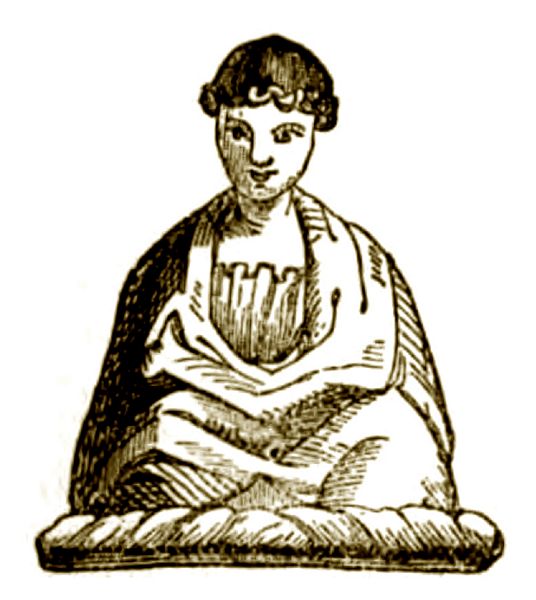
With the exception of these few esculents, the
environs of Tolon-Noor produce absolutely nothing whatever. The
soil is dry and sandy, and water terribly scarce. It is only here
and there that a few limited springs are found, and these are dried up
in the hot season.
Footnotes:
[Continue to Chapter 2]
[Return to Table of Contents]
|
|
| Southport main page Main
index of Athena Review
Copyright © 2023 Rust Family Foundation.
(All Rights Reserved). | | |
.
|